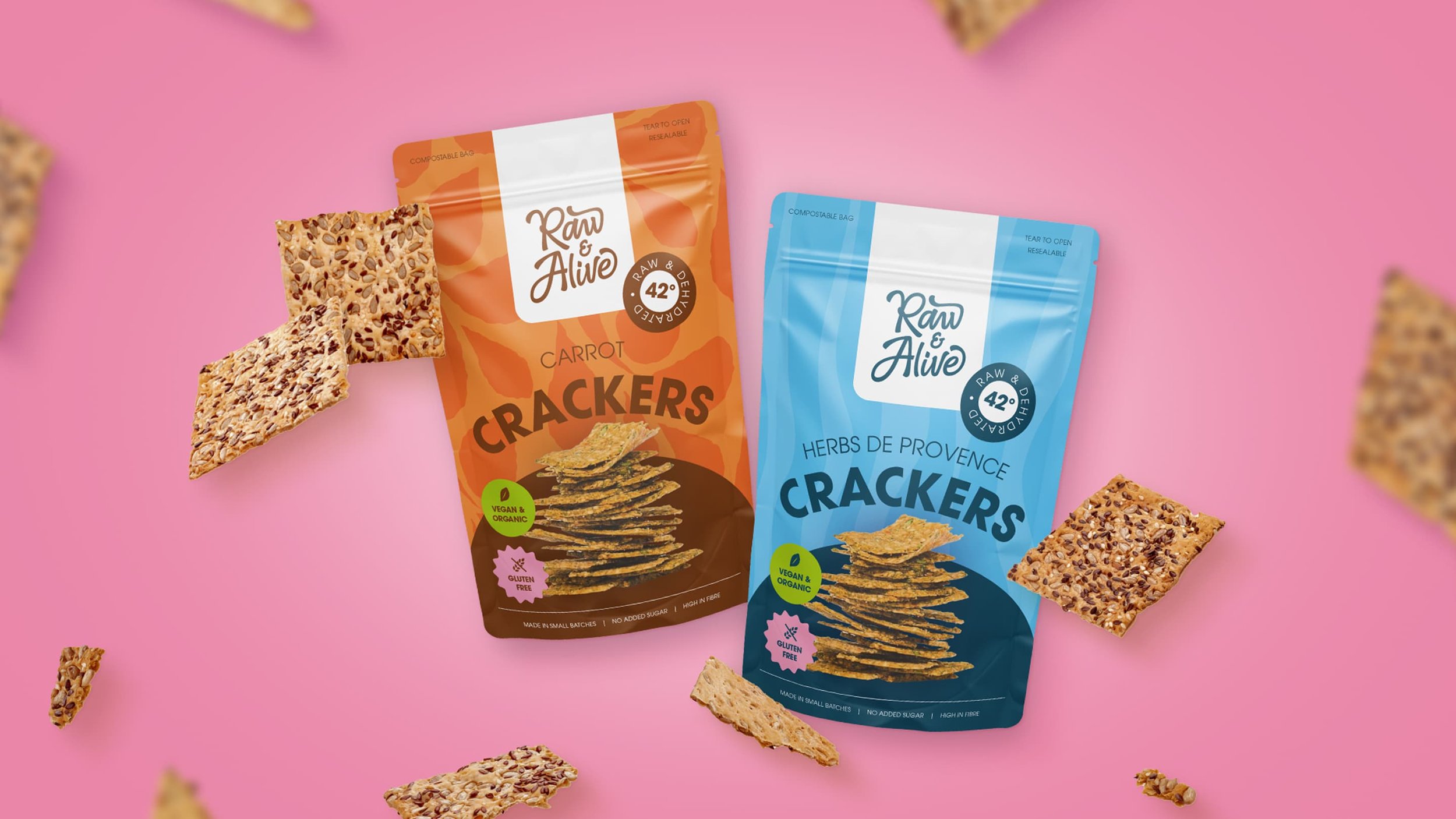
Nourish Naturally.
Organic, dehydrated, fermented, and freeze dried food crafted with care and love.
Shop Our Products
Our products are raw, vegan, gluten-free, and organic, made with only a few highest quality natural ingredients, without any nasty nonsense.
Our motto? Keep it simple: less is more.
All our products are raw and alive as we dehydrate them at 42° in order to preserve natural enzymes and vitality.

What Our Customers Say
Join Our Healthy Food Revolution!
Sign up to receive exclusive offers, delicious recipes, and the latest updates on our sprouted, vegan, and organic products.
FAQs
-
Fermented foods offer numerous health benefits, primarily through their effects on gut health, nutrient absorption, and overall wellness. Here are some key health benefits associated with consuming fermented foods:
Probiotic Content: Many fermented foods are rich in probiotics—live microorganisms that can provide health benefits when consumed in adequate amounts. Probiotics support the balance of gut bacteria, which is essential for digestive health and immune function.
Improved Digestion: Fermentation helps break down complex carbohydrates, proteins, and fats, making them easier for the body to digest. This can be especially beneficial for individuals with lactose intolerance or certain food sensitivities.
Boosted Immune System: A healthy gut microbiome, supported by probiotics from fermented foods, plays a crucial role in immune response. Consuming these foods can enhance immunity and may help reduce the risk of infections.
Enhanced Nutrient Absorption: Fermentation can increase the bioavailability of vitamins and minerals, such as B vitamins and minerals like iron and calcium. This enables the body to absorb and utilise these nutrients more effectively.
Weight Management: Some studies suggest that probiotics may help regulate weight by influencing fat storage, metabolism, and appetite. Fermented foods can also promote satiety, helping to control hunger.
Lowered Risk of Chronic Diseases: Regular consumption of fermented foods has been associated with a reduced risk of certain chronic diseases, including heart disease, type 2 diabetes, and obesity, likely due to their positive effects on metabolism and inflammation.
Mental Health Benefits: Emerging research links gut health to mental health, often referred to as the "gut-brain axis." Probiotics and fermented foods may help improve mood and reduce symptoms of anxiety and depression.
Anti-Inflammatory Properties: The compounds produced during fermentation may have anti-inflammatory effects, helping to reduce chronic inflammation, a common factor in many diseases.
Detoxification: Fermented foods can assist in detoxifying certain compounds in the body. For example, fermented soy products may reduce the toxicity of certain phytates present in raw soybeans.
Healthier Skin: The beneficial bacteria in fermented foods can also promote skin health, potentially improving conditions like acne or eczema by reducing inflammation and supporting immune function.
Incorporating a variety of fermented foods, such as yoghurt, kefir, sauerkraut, kimchi, kombucha, and miso, into your diet can contribute to overall health and well-being. However, it’s essential to consume these foods as part of a balanced diet for the best results.
-
Dehydrated crackers made at a low temperature, such as 42 degrees Celsius (approximately 108 degrees Fahrenheit), often fall into the category of raw food. Dehydration preserves the nutrients in ingredients like seeds, nuts, grains, and vegetables, while also enhancing flavours and extending shelf life. Here are some potential health benefits of consuming dehydrated crackers made at this temperature:
Nutrient Preservation: Dehydrating at low temperatures helps retain heat-sensitive nutrients, such as B vitamins, vitamin C, enzymes, and antioxidants, which might otherwise be lost through traditional cooking methods.
Increased Digestibility: Dehydrated crackers made from nuts and seeds are often easier to digest than their whole counterparts, especially if sprouted before drying. Sprouting can help reduce anti-nutrients, such as phytic acid, improving nutrient absorption.
Rich in Fibre: These crackers are typically high in dietary fibre, which supports digestive health, helps regulate blood sugar levels, and promotes a feeling of fullness that can aid in weight management.
Healthy Fats: If made from nuts and seeds, dehydrated crackers often contain healthy fats, including omega-3 and omega-6 fatty acids. These fats are essential for brain health and may help reduce inflammation in the body.
Low Glycaemic Index: Dehydrated crackers generally have fewer carbohydrates than traditional baked crackers, which may help maintain stable blood sugar levels—beneficial for those managing diabetes or blood sugar fluctuations.
Mineral Content: Nuts and seeds are a good source of essential minerals such as magnesium, zinc, iron, and calcium. Including these in your diet can help support overall health and well-being.
Satiating Snack: Thanks to their nutrient density and fibre content, dehydrated crackers make a satisfying snack that helps curb hunger between meals without the high calories of processed snacks.
Convenient and Versatile: Dehydrated crackers are easy to transport and can be enjoyed in various ways—paired with dips, spreads, or as part of a balanced meal.
-
Freeze-dried food, which undergoes a process of freezing followed by moisture removal under vacuum, offers several health benefits that make it an appealing choice for many. Here are some key health benefits of freeze-dried foods:
Nutrient Retention: The freeze-drying process preserves most of the food's nutrients, including vitamins and minerals, more effectively than many other preservation methods, such as canning or cooking. This makes freeze-dried foods a nutritious option.
Long Shelf Life: Freeze-dried foods can last for years without significant quality degradation, making them ideal for emergency preparedness, outdoor activities, and maintaining a well-stocked pantry.
Lightweight and Convenient: Freeze-dried foods are significantly lighter than their fresh counterparts due to the removal of moisture, making them easy to transport and perfect for camping, hiking, and travel.
Easy to Prepare: Most freeze-dried foods can be quickly rehydrated with water, making meal preparation simple and fast. This convenience is especially useful for busy individuals or during emergencies.
Retained Flavour: Freeze-drying helps maintain much of the food's original flavour, providing a more satisfying eating experience when rehydrated compared to some other preservation methods.
Variety: Freeze-drying can be applied to a wide range of foods, including fruits, vegetables, meats, and even prepared meals, allowing for a diverse diet even when relying on stored foods.
Low in Additives: Many freeze-dried foods contain no preservatives, artificial colours, or flavours, making them a healthier choice compared to many processed foods high in additives.
Hydration and Nutrient Boost: When rehydrated, freeze-dried fruits and vegetables can add both nutrients and hydration to meals, which is especially valuable during outdoor activities where fresh produce may not be readily available.
Glycaemic Control: Freeze-dried fruits and vegetables retain their fibre content, which can help regulate blood sugar levels when included as part of a balanced diet.
Overall, freeze-dried foods are a nutritious, convenient, and versatile choice, supporting a healthy diet while offering practicality in storage and preparation. Whether for everyday use, outdoor adventures, or long-term emergencies, freeze-dried foods can be an excellent addition to a balanced diet.
-
Choosing to buy organic food often involves a range of health, environmental, and ethical considerations. Here are some reasons why many consumers choose organic products:
Reduced Chemical Exposure: Organic farming practices limit the use of synthetic pesticides, herbicides, and fertilisers. By buying organic, you can reduce your exposure to potentially harmful chemicals that may remain on or in conventionally grown foods.
Higher Nutritional Value: Some studies suggest that organic foods may contain higher levels of certain nutrients, including antioxidants and vitamins, due to organic farming methods and practices that enhance soil health.
Better for the Environment: Organic farming promotes biodiversity, improves soil health, and reduces pollution. Sustainable practices, such as crop rotation, composting, and minimising chemical runoff, contribute to healthier ecosystems.
No GMOs: Organic products are not allowed to contain genetically modified organisms (GMOs). Purchasing organic ensures that you avoid GMOs and support non-GMO farming practices.
Animal Welfare: Organic farming standards often include higher welfare conditions for livestock, ensuring animals are raised more humanely, have access to outdoor space, and are fed organic feed without antibiotics or growth hormones.
Flavour and Quality: Many consumers report that organic fruits, vegetables, and meats have superior flavour and quality compared to conventionally grown options, likely due to farming practices that prioritise soil and plant health.
Support for Local and Small Farmers: Buying organic often supports smaller, local farms rather than large agricultural corporations, helping sustain local economies and promoting community wellness.
Reduced Antibiotic and Hormone Exposure: Organic meat and dairy products come from animals not given antibiotics or growth hormones, reducing your exposure to these substances.
Sustainable Practices: Organic farming emphasises sustainable practices that can help combat climate change, such as reducing greenhouse gas emissions and preserving water quality and biodiversity.
Healthier Soil: Organic farming focuses on maintaining healthy soil through natural methods, leading to healthier crops and a more resilient food system.





